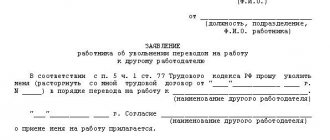Article 73 of the Labor Code of the Russian Federation with comments - 2017
Art. 73 of the Labor Code of the Russian Federation orders a company whose employee has received a doctor’s verdict to change his occupation for a certain period, to provide such a specialist with other work that will not be contraindicated for him.
IMPORTANT! Such an employee can be transferred only if he records his consent in writing.
Therefore, if the specialist does not mind, then it will be enough to record the translation with an order in free form; however, there is no need to note anything in the specialist’s work book.
For information on how to issue such an order, read the material “Order to transfer an employee to another position - sample.”
Difficulties arise if the employee refuses the transfer for any reason. In this case, the consequences will depend on the period for which the doctors recommended that he change his occupation. In this case, 2 options are possible: temporary suspension or final dismissal, which will be discussed below.
In addition, Article 73 of the Labor Code of the Russian Federation establishes that if contraindications are made to the head of a company or its structural unit or to the chief accountant, then the possible consequences will depend not on the period of the recommended transfer, but on what decision the company makes.
Commentary on Article 73 of the Labor Code of the Russian Federation
The commented article provides for the transfer of an employee who, for health reasons, needs to be provided with another job in accordance with a medical report.
The employer is obliged to follow the medical report and provide the employee, with his written consent, with other available work that is not contraindicated for his health.
Transfer in accordance with a medical report can be either permanent or temporary.
In order to maintain the stability of labor relations in cases where an employee needs a temporary (up to four months) transfer to another job for medical reasons, it is allowed, if the transfer is refused or the employer does not have the appropriate work, the employee may be suspended from work for the entire period specified in the medical report period without pay (except for cases when the Labor Code, other federal laws, collective agreements, agreements or employment contracts do not provide otherwise). An important legal guarantee is that the employee retains his place of work (position) for the entire period of suspension from work.
If the employee needs a permanent transfer or the period of temporary transfer exceeds four months, the employer has the right to dismiss the employee under clause 8 of Art. 77 of the Labor Code, but only if one of two conditions is present: if the employee refuses to transfer or the employer does not have the appropriate work.
For heads of organizations (branches, representative offices or other separate structural units), their deputies and chief accountants who, in accordance with a medical report, need a temporary transfer to another job, a special rule has been established, according to which the employer has the right to either dismiss such an employee under clause. 8 tbsp. 77 of the Labor Code, or, with his written consent, remove him from work if the employee refuses the transfer or such transfer is impossible due to the employer’s lack of relevant work.
Wages are not accrued during suspension from work, except in cases provided for by the Labor Code or other federal laws, collective agreements, agreements, or employment contracts.
Reasons for transfers
Here we must rely on Article 73 of the Labor Code of the Russian Federation. It says that the main reason for such an event should be a medical report. The issuance of a document must comply with laws at the federal and regional levels. An example is a disability certificate. Or it describes the degree of restrictions associated with a particular activity.
There are other types of documents accepted for accounting:
- A certificate stating the percentage of loss of ability to further work.
- Description of the rehabilitation program, including in the case of occupational diseases and injuries.
- Conclusion of the medical institution where the employee’s medical examination was carried out.
- Conclusion from the antenatal clinic doctor.
UrDela.ru
An employee who needs to be transferred to another job in accordance with a medical report issued in the manner established by federal laws and other regulatory legal acts of the Russian Federation, with his written consent, the employer is obliged to transfer to another job available to the employer that is not contraindicated for the employee for health reasons.
If an employee who, in accordance with a medical report, needs a temporary transfer to another job for a period of up to four months, refuses the transfer or the employer does not have the corresponding job, then the employer is obliged to suspend the employee from work for the entire period specified in the medical report while maintaining his job ( positions). During the period of suspension from work, wages are not accrued to the employee, except in cases provided for by this Code, other federal laws, collective agreements, agreements, and employment contracts.
If, in accordance with a medical report, an employee needs a temporary transfer to another job for a period of more than four months or a permanent transfer, then if he refuses the transfer or the employer does not have the corresponding job, the employment contract is terminated in accordance with paragraph 8 of part one of Article 77 of this Code .
An employment contract with the heads of organizations (branches, representative offices or other separate structural units), their deputies and chief accountants who, in accordance with a medical report, need a temporary or permanent transfer to another job, if the transfer is refused or the employer does not have the corresponding job, is terminated in in accordance with paragraph 8 of part one of Article 77 of this Code.
The employer has the right, with the written consent of these employees, not to terminate their employment contract, but to remove them from work for a period determined by agreement of the parties. During the period of suspension from work, wages are not accrued to these employees, except for the cases provided for by this Code, other federal laws, collective agreements, agreements, and employment contracts. ‹ Article 72.2 (Labor Code of the Russian Federation) Temporary transfer to another job Up Article 74 (Labor Code of the Russian Federation) Changes in the terms of the employment contract determined by the parties for reasons related to changes in organizational or technological working conditions ›
How is it paid?
Wages for light work cannot be lower than the average salary for performing ordinary duties. Such a proposal is unlawful according to Art. 254 Labor Code of the Russian Federation.
For example, if before the transfer an employee received about 30,000 rubles a month, then the salary in the new place should be from 25-30 thousand rubles.
An exception is the transition to part-time work; when this is done, the salary is reduced in proportion to the hours worked.
For example, when switching to an incomplete 30-hour week, an employee will completely legally lose a quarter of his salary, and 30,000 rubles will turn into 22,500.
In the case of a transfer to a position with a noticeably higher salary, the employer needs to be prepared to report on the employee’s qualifications to the Social Security Fund, which may consider such highly paid work as fraud in order to increase the amount of benefits. This may result in the company being denied reimbursement of government benefits.
Sick leave and vacation
Sick leave is calculated as usual, as in normal work. We remind you that the benefit is directly related to length of service and earnings. With eight years of experience or more, the employee will receive 100% of earnings, with five to eight years of experience - 80%, with less than 5 years of experience - 60%.
The category of workers engaged in light labor has the right to an annual paid leave of one month or unpaid leave for 60 days at their choice.
How to properly prepare a translation
To transfer to a lighter form of work, the employee and the employer need to collect a package of documents:
- Medical certificate in one of the above options.
- An application in free form or according to the company’s sample, in which the employee asks to be transferred to a position with different operating conditions.
- Additional agreement signed by the employee and the manager, which describes their relationship for the period of validity of the certificate.
- Order for transfer to a position.
So, the algorithm for processing the transfer of an employee to light work will look like this:
- The first step is to provide the employer free-form transfer application
- The employer reviews the application and signs an order of dismissal .
- In addition to the general director, the document is certified by the chief accountant and all direct management of the employee.
- The director can then submit a proposal for transfer to the position in writing , indicating the salary and period of replacement. The employee may or may not sign the offer.
- The translation is made in accordance with Art. 72 of the Labor Code of the Russian Federation and entails a change in the employee’s duties, place of work and salary . All these changes are noted in the additional agreement to the employment contract.
- is drawn up in standard (T-5) form for transfer to another job . The employee must familiarize himself with the order against signature, receive a new job description and receive the regulations required upon taking up the position. You will also have to make an additional entry in the work book if the transfer is permanent.
Transfer deadlines
Transfer to light work can last either a limited time (for illnesses and injuries) or an unlimited time (disability, chronic diseases, injuries). With a medical prescription for up to 4 months, the employer does not have the right to dismiss the employee, only to suspend him for the period of reduced working capacity with the same salary, or offer other comparable options.
If easier conditions are required for a period of more than 4 months, then the organization may dismiss the employee with payment of severance pay.
After the end of the term, the employee can retain a new position by mutual agreement with the employer, in which case the term of work in the additional agreement is canceled, and the contract is considered automatically extended. Do not also forget that the employee has the option of resigning at his own request at any time.
Basic principles of labor law
Legal principles are the fundamental principles on which labor law is based.
The basic principles of labor law are:
1) freedom of labor, including the right to work (Article 37 of the Constitution of the Russian Federation), the right to dispose of one’s ability to work, to choose a profession and type of activity;
2) prohibition of forced labor and discrimination in the sphere of labor (Articles 3 and 4 of the Labor Code of the Russian Federation);
3) protection from unemployment and assistance in finding employment (comments to Article 2 of the Labor Code of the Russian Federation);
4) ensuring the right of every employee to fair working conditions (Article 2 of the Labor Code of the Russian Federation);
5) equality of rights and opportunities for workers (ibid.);
6) the right of every employee to timely and full payment of fair wages and not less than the established minimum wage (minimum wage) (Articles 21 and 132 of the Labor Code of the Russian Federation);
7) ensuring equal opportunities for workers without discrimination for promotion, taking into account labor productivity, qualifications and length of service in their specialty, as well as for professional training, retraining and advanced training (Article 1);
 ensuring the right of employees to participate in the management of the organization in the forms provided for by law (Article 21 of the Labor Code of the Russian Federation);
ensuring the right of employees to participate in the management of the organization in the forms provided for by law (Article 21 of the Labor Code of the Russian Federation);
9) a combination of state and contractual regulation of labor relations and relations directly related to them (Articles 2 and 9);
10) social partnership, including the right to participation of workers, employers, and their associations in the contractual regulation of labor relations and relations directly related to them (Comments to Article 23);
11) compensation for harm caused to an employee in connection with the performance of his labor duties (Article 21 of the Labor Code of the Russian Federation);
12) establishment of state guarantees to ensure the rights of workers and employers, implementation of state supervision and control over their compliance (Article 2);
13) ensuring everyone’s right to protection by the state of their labor rights and freedoms, including in court (Article 46 of the Constitution of the Russian Federation, Article 64 of the Labor Code);
14) ensuring the right to resolve individual and collective labor disputes, as well as the right to strike (Articles 142.379 and 410 of the Labor Code of the Russian Federation);
15) the obligation of the parties to the employment contract to comply with the terms of the contract, including the right of the employer to demand from employees the performance of labor duties and careful attitude to property and the right of employees to demand from the employer to fulfill obligations towards employees (Article 56 of the Labor Code of the Russian Federation);
16) ensuring the right of representatives of trade unions to exercise trade union control over compliance with labor legislation and other acts containing labor law norms (Article 370);
17) ensuring the right of workers to protect their dignity during their working life (Article 2);
18) ensuring the right to compulsory social insurance of workers (Articles 21 and 22)).








